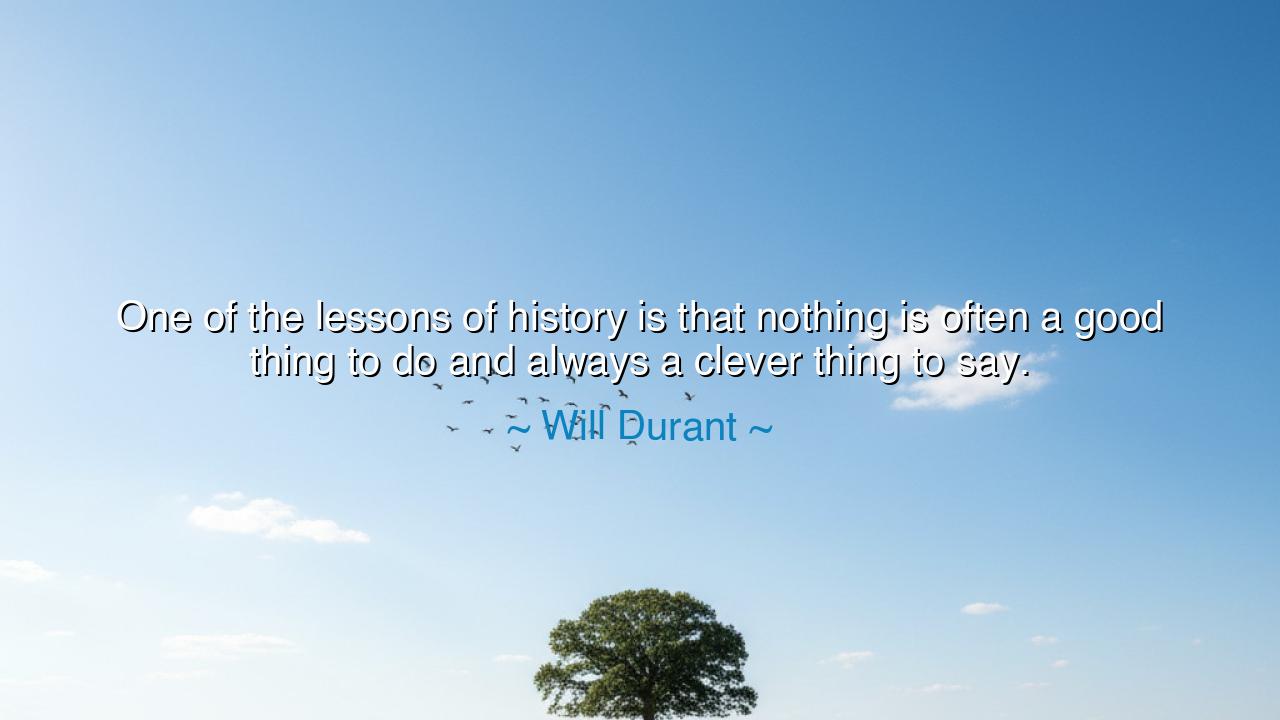
One of the lessons of history is that nothing is often a good
One of the lessons of history is that nothing is often a good thing to do and always a clever thing to say.






The historian and philosopher Will Durant, who spent his life weaving the vast story of human civilization into wisdom, once observed with quiet irony: “One of the lessons of history is that nothing is often a good thing to do and always a clever thing to say.” In this statement, he captures the paradox of human action — that sometimes inaction is the truest wisdom, and silence, the most intelligent speech. His words are not a call to passivity, but to discernment. For Durant, who had studied the rise and fall of empires, the folly of kings, and the vanity of men, knew that many of history’s greatest disasters were not born of evil intent, but of hasty action and reckless speech.
The origin of this quote lies in Durant’s lifelong reflection on the patterns of history. Together with his wife, Ariel Durant, he composed The Story of Civilization — eleven volumes chronicling the journey of humankind from the ancient world to modernity. Through that long meditation upon the ages, he saw how men and nations, in their thirst for glory or righteousness, so often hastened their own ruin. He learned that wisdom is not found in constant doing, but in knowing when to pause, when to wait, and when to say nothing at all. From this deep well of reflection came his ironic yet profound counsel: that often, the wisest course is restraint, and the cleverest reply is silence.
In truth, history overflows with examples that prove his words. Consider Emperor Napoleon Bonaparte, whose genius led him to conquer most of Europe, yet whose restless ambition drove him onward until he destroyed himself. Had Napoleon learned to do nothing when he already held all of Europe in his grasp, he might have lived out his days in majesty. But the lust for motion — the inability to be still — carried him into the snows of Russia and the doom of Waterloo. His downfall was not for lack of talent or courage, but for lack of patience. So too, Durant reminds us, the greatest wisdom may sometimes be to stay one’s hand, to resist the temptation of action for action’s sake.
And what of words? How many times has history turned upon the rash tongue of a man who could not be silent? Kings have lost crowns, nations have lost peace, and lovers have lost each other because pride could not bear to hold its speech. In contrast, those who master their words often master their fate. Abraham Lincoln, in his youth, once wrote a harsh letter mocking a rival in politics. When that letter became public, it nearly ended in bloodshed. From that day forward, Lincoln learned the power of measured speech. Later, as President during the Civil War, he wielded silence and patience as his greatest tools — answering insults with calm, waiting for the right moment to speak, and letting history vindicate him. In this, he became the living embodiment of Durant’s wisdom.
To say that “nothing is often a good thing to do” does not mean to avoid duty or shrink from challenge. It means to act only when the time is ripe, and to speak only when one’s words serve truth rather than vanity. The wise do not rush; they wait like the farmer who sows and trusts the season. The fool, eager to harvest before the seed takes root, destroys his own work. Durant’s humor hides a grave truth: inaction guided by wisdom is not weakness — it is the highest form of mastery. For only those who have conquered their impulses can truly act with purpose when the moment demands it.
Even in the realm of ordinary life, this lesson resounds. How many quarrels, regrets, and failures could be avoided if one learned the art of strategic stillness? To pause before reacting, to breathe before answering, to reflect before deciding — these are the habits of those who endure. When the storm of anger rises, doing nothing is strength. When temptation whispers haste, silence becomes courage. The world praises speed and noise, but history praises patience and wisdom. To say little, to act wisely, to let time be one’s ally — this is the mark of those who shape history rather than being consumed by it.
Therefore, my children of this restless age, let the counsel of Will Durant be carved upon your hearts: Do not mistake movement for progress, nor speech for wisdom. The river that rushes loudest often runs shallow; the one that moves slowly carves canyons through the earth. Learn to be still. Learn to listen. Learn to do nothing when nothing is best. When you act, act with purpose; when you speak, let your words be few and full of meaning.
For indeed, as Durant said, nothing — in its right time and place — can be a good thing to do, and often the cleverest thing to say. To master this art is to walk the path of the wise: to live not as a creature of impulse, but as a steward of time, a builder of peace, and a witness to the quiet strength that moves the world.






AAdministratorAdministrator
Welcome, honored guests. Please leave a comment, we will respond soon